White Plume Mountain (greyhawk) Read online
White Plume Mountain
( Greyhawk )
Paul Kidd
Paul Kidd
White Plume Mountain
PROLOGUE
To a newcomer, the Flanaess had a distinctive, brilliantsmell, vibrant and alive, sharp and pure. It sang in a predator’s nostrils withpromises of blood. All the life, all the wealth, all the thrill of a newfound playground shook and shimmered in the morning breeze.
A predator stood upon a hillside, eyes closed as she felt the currents of her new world ebbing and flowing beneath her. It was a land drained and torn by war-a shadow of the greater battle that raged unchecked across anentire continuum. But it was a living land, a world of sun and grass, of cities and animals and birds dancing in the winds, a world that she could one day dominate and command.
New winds ruffled the feathers of her pure white wings. Saala was of the race of baatezu, demons that existed in a dozen different shapes and forms. An erinyes, she was a lean and exquisite huntress who wore the body of a beautiful winged woman, her skin shining pale and exotic as her body gleamed beneath the sun. In her hand, she held a black sword, a deadly weapon now safe in a scabbard decorated with cut obsidian. Despite its temporary prison, the sword chattered like a hungry animal, gibbering madly with the need to feast on souls.
A master of deception and fear, Saala had long used her weapons in the service of her dark masters. Now, abandoned and disgraced by the twists and turns of politics, she had come far afield in search of fertile hunting grounds. The erinyes was a solitary huntress, preferring the use of slaves rather than allies. She roamed the forgotten corners of countless worlds, forever seeking opportunities.
Her search had finally yielded treasure.
Saala turned her golden-eyed gaze upon the lands below her. A city lay there, a place with shantytowns and military camps spilling out of its old stone walls. There were temples and palaces, docks and taverns, all the glorious tangle of streets and plots and plans that made the hunt so rapturously wonderful. Saala gazed down upon the city in all its fabulous complexify and gave the simple smile of a little girl at play. It was a place of opportunities, a place utterly ignored by the erinyes’ own race.
Beyond the city lay the wastelands, and beyond the wastelands lay a kingdom ruled by Iuz, a demonic king who had attained the powers of a demigod, spreading terror and destruction across this green world. Yet, unknown to even him, Iuz had brought her a gift beyond price. To further his own power, Iuz had summoned demons of the tanar’ri race, and in so doing, he had become apawn in an even greater war, for tanar’ri and baatezu had been locked in savageconflict for millennia untold. This conflict had spread to countless different worlds, and minor wars between mortals often became the testing grounds of baatezu and tanar’ri. Each species manipulated their unwitting allies, layingentire nations waste as they grasped for tactical advantage in the greater war.
By summoning tanar’ri as his allies, Iuz had overtipped thebalance of power and given Saala the opportunity to enter this world. The erinyes could now conquer a local kingdom as a base and turn it into a tool for her own kind. When her masters raced to this world to stem the tanar’ri threat,Saala would be able to present them with a secure base and thousands of unwitting slaves. A tiny slip of chance might win her entire kingdoms, and the gratitude of her baatezu overlords would be incalculable if she only brought them the gift of victory.
All she need do was conquer a kingdom-and all on her own. Thecurrent situation merely needed a little misdirection, a little misrepresentation.
The sword suddenly shivered in its sheath, whimpering and calling for a human hand to wield it. With the weapon as her tool, the erinyes could bring a city to its knees from within. She needed only a little forethought, a little patience, and imagination. Feeling the movement of her thoughts, the sword moaned, and Saala smiled.
All things came to those who knew the value of subtlety. Saala flexed her claws, folded up her wings, and set her mind to the pleasurable task of intrigue. A city to conquer, a land to subdue, and an entire world lying supine at her feet.
There were some days when it was simply good to be a girl….
On a windswept heath in a blighted land, seed heads rattledagainst the teeth of an old, yellowed skull.
It had been only a year since the war’s end, only a yearsince the corpse king Iuz had sent his legions through these fertile lands like a disease. Finally battered to a standstill, the enemy had gone, having the land bleached and empty.
It was a land where the grass had become an ocean. Novillages marked the skyline. No taverns spread their wood smoke to the wind. Across the plains, no two stones stood atop one another. Wild grasses grew in untilled fields, and weeds jutted through the blackened ribs of dead, decaying farms.
Yet, life was tenacious even in the face of death. Wild cropsgrew across the battlefields and covered up the bones. Refugees had crept from the woods to repopulate the borderlands in huddled camps. Once again, the caravans marched as trade and communication struggled to reknit shattered civilization.
It was a world that had begun once again to find its feet.
It was a time when justice reached no farther than the end ofa sword….
1
“Razor Wood! Over there! It’s called Razor Wood!” Theteamster swept out his whip to indicate the approaching terrain, almost taking the ear off one of his own oxen. “You can still see the swords poking up throughthe brambles! Nigh on a thousand men died there not three years a-gone.”
Polk the teamster sat on his driving bench, lord of all that he surveyed. Scrawny, boisterous, and graced with a huge hatchet of a nose, he drove his cart with a singular lack of skill. Heavy wooden wheels screeched like tortured cats as the ox cart lurched its way along the open grass, forcing the teamster to shout to be heard above the noise.
His audience was a man walking alone with a slow and steady tread beside the cart. He was a big man with a shaven head and dark eyes that carefully scanned the heather-covered hills. A scar ran outward to the point of his stubbled jaw. Over plain clothes he wore armor made of rawhide scales laced into strips and backed with heavy felt. The armor was silent, well worn, and as tough as steel. A sturdy helmet hung from the man’s belt below a long, heavysword with a pommel shaped like a wolf’s skull.
The walker stayed silent, and Polk approved. A good listener. Now that was a rare thing to find! The teamster took a pull from an old clay jug and watched the evening sun setting above the bleak gray woods beside the trail.
“Razor Wood. Yes indeed. I saw me a battle once! Saw me awhole big battle. Even saw me some fellas dueling with swords!” The teamsterscratched beneath his hat as though stirring up memories. “You ever seen a swordfight? I mean a real fight, a fight where they mean business?”
Plodding along stolidly, the stranger kept his eyes on the horizon and replied, “Can’t say I have.”
“Well I saw me one. Big fellas they were, big men. Longblades, too-big as trees!” Leading a procession of wagons and feeling like ageneral on parade, Polk puffed his chest. “Bein’ a fighting man myself, I leftthem to it. Never interfere in another man’s work-that’s what I always say.Never interfere.”
His audience’s attention seemed to be wandering. As the wagoncontinued rolling by, the shaven-headed man stopped to kneel beside the trail and part the grass. His eyes narrowed as he examined a day-old horse dropping nestled in the weeds.
The County of Urnst stood at the northern edge of civilization. Beyond its northern march, there stretched only the lands of the demon king Iuz. Recovering slowly from the years of war, the County of Urnst had begun to plant colonies in lands laid waste by years of battle. With the fields new-dug and crops
still not yet ready for harvest, the new settlements relied heavily upon supply caravans as their lifeblood, their only reliable source for food and clothing to survive the coming winter. Until their crops matured and real farming could begin, each little enclave lived a precarious existence, but the resettlement program was vital. The Countess of Urnst needed to take refugees from her overcrowded cities and sow them back onto the lands before plague and famine struck at the slums.
The latest caravan had traveled cautiously along hidden valleys and unmarked plains, carefully watching for bandits and other predators. There were twelve wagons in the procession, heavy slab-sided vehicles each drawn by half a dozen oxen and piled high with boxes, sacks, and bales. A dozen more traders marched beside the column towing packhorses and mules. Six crossbowmen sat atop the wagons or trudged waist deep in the heather blooms, keeping the procession safe from casual acts of war.
The teamsters trusted the soldiers. The soldiers trusted their gods. No one seemed inclined to watch the watchers. Letting the carts roll ponderously past, the shaven-headed man looked out along the column and carefully let the grass cover up his prize.
Up ahead, Polk leaned over the side of his wagon and called back past the wheels. “I said I never interfere! Wrong gettin’ in the way of aman’s work. We all have our calling. Ain’t for me to distract a man when he’sdoing good work.”
The woods were close, forming a tangled mass of brambles and stark, dead trees. The shaven-headed man hefted his heavy backpack and stalked beside the wagons without giving the eerie woodlands a second glance.
A long black wolf tail dangled from the man’s backpack.Eyeing the fur, Polk pulled at his nose and made a conspiratorial jerk of his head toward the man’s cargo.
“You a hunter?” The teamster never waited for an answer.“Reckoned you were when I saw you packing all those furs. Winter comes hard upnorth, and there’s folks going to need those furs. That the business you’re in?You a trapping man?”
The stranger nodded. “I trap things.”
“Right glad to hear it.” The teamster prodded his lead oxenaway from a juicy thistle. “Gotta admire a good fur.”
Before the teamster could think of anything else to say, a rider spurred his horse from around the edge of the woods ahead. With his long greasy hair streaming in his wake, the rider raised his bow in greeting and thundered his black horse through the clinging heather toward the caravan. As the man reigned in his mount next to Polk’s wagon, the teamster passed his stonejug of home-brewed ale.
“Hey, scout, how’s the trail?”
The scout casually holstered his bow and said, “Clear. Headinto the woods and camp for the night. Plenty of firewood, plenty of water.”Circling his horse, the scout stood in his stirrups and circled his arm like a banner about his head. “Make camp! Make camp in the woods! The woods are clear!”
The rider took a long drink from the jug, then threw it to the teamster and cantered back along the wagon line. The teamster watched him ride, corking his jug and giving an admiring smile.
“Now here’s another man knows his business! Some otherscouts, they might keep you out on the plains. But a campfire? Well now, you can see that from a powerful ways away! So into the forest we go. That’s the thingto hide a fire!”
The shaven-headed man took a long, quiet look at the woods. “I suppose so.”
Drawing closer to the dark, silent sprawl of Razor Wood, the caravan cast long shadows across the grass. With the sunset spreading a dark wine-red light across the lands, the first wagon crunched through the underbrush and made its way beneath the eaves of the forest. The cumbersome wagons moved between dead, silent trees. All about the caravan, dry branches raked stark fingers against the sky. Brambles made tangled thickets between the trunks, blocking off the slanting light of the sun. Dead blackberry bushes cracked and crunched beneath the wheels, dragging sharp tendrils across the oxen’s hides.Here and there, small black shapes sped off into the shadows, turning about to stare at the intruders with hostile little eyes.
As the last of the day’s light failed, the wagons werewearily parked in a circle. Men slid to the ground to stretch their legs. A harsh wind filtered through the brambles to promise a bitter night, and several of the wagoners began to gather dead branches for a fire.
Polk’s wagon was entirely laden with barrels of fish oil. Itstank like a fisherman’s nightmare, making most of the other wagondrivers parkupwind. Ignoring such little niceties, the talkative teamster drove up amidst the stench and chose to halt there for the night. He stood, suddenly discovered that His entire backside had gone numb, and lurched down to the ground on legs made wooden by a long day’s haul.
“Cold nights coming! Better feed the livestock a peck of alewith their bran.” The man cricked his back with a noise like a breaking branch.“What’s your name, son? Never did remember hearing you speak your name.” Theteamster hung his hat from a nearby branch. “M’ name’s Polk, by the way! Polkthe teamster, or Polk the adventurer. Transport to adventure!” The gangly Polkgave his wagon a slap. “Never drink with a man you can’t pin a handle on, son!So what’s your name? What do you do?”
The shaven-headed man shot a dark sidewise glance at the teamster and said, “Justicar.”
“Justicar? Is that religious?”
“The only religion that counts.” The shaven-headed mandropped his backpack on the ground. His huge sword stayed hanging at his side. He dug into his backpack and drew out a blue glass flask, uncorked it, took a sip, then passed it over to the teamster.
“Drink.”
The teamster drank, sucking back the raw alcohol as though it were lemonade. He sighed in appreciation, caring not a fig for the cold, the wolves, the empty forest, or even the fires beginning to sparkle to life around the camp.
“Now that’s a fine drop! You can cure a thirst, son! Muchobliged!”
“Keep it. Stay here, be quiet, and drink.” Moving his bighands with practiced speed, the Justicar fussed with his pack, watching the caravan guards from the corner of his eye.
The evening routine had begun, just as it had for the last dozen nights on the trail. Weary men moved slowly, still working out the kinks caused by a long day’s travel. Dry branches were thrown on smoking fires andblanket rolls were tossed onto the ground. Men began unhitching the oxen. Eventually someone would have to see about watering the creatures at the nearby stream.
Filled with an uncharacteristic energy, the caravans mounted scout whooped and leaped off his jet-black horse, picketing the beast to a tree and wandering off toward the stream. He neither unsaddled his horse nor led it to water. The horseman even walked straight past a bucket that hung from a wagon’s tail.
The Justicar raised his head and watched the scout with a careful gaze. “You have a clever scout. I’ve watched him work. Where did youfind him?”
The scout disappeared off into the dead gray trees.
“Assigned to us! We’re an official expedition. The Countessmust have paid for him, ’cause he never cost us a penny! Joined us back atBulette Creek.” The teamster had taken permanent possession of the plum brandyand already seemed rosy-cheeked and hale. “Never turn aside free help, son! Longas they bring their own ale, I’m glad to have him. There’s two caravans venturedout this way that no one’s ever seen again.”
“Three.” Rising carefully from the ground, the Justicarexamined a strand of horsehair hanging from a bramble leaf. The hairs shone golden bright in the failing sun. “You’re missing three caravans.”
“Three is it? Then it’s good to have some extra help along!”The teamster pummeled his numb backside with his fists. “Not that we’ll need it!Simple job. Spearheads, winter food, and blankets to the settlements, then back home. Done it a dozen times.”
The Justicar turned to brood upon the dark, still woods. “Then we’ll make sure you do it a dozen more.”
A cold wind blew through the desolate trees, making the wagoners huddle about their fire for warmth. With the woods becoming da
rk, men turned more and more to staring at the fire. The Justicar watched, picked a moment when the men were looking elsewhere, then lifted his backpack and faded behind the wagons. As sparks crackled madly from a brushwood fire, he opened his backpack and unrolled a lustrous black wolf pelt across the ground.
The skin was resplendent with claws, tail, a black nose, and teeth that would have done credit to a crocodile. Its grin shone bright as firelight caught across the huge, bared fangs.
Polk had followed the Justicar around the wagon and stared at the wolf skin in unstinting admiration.
“Now that’s a fine pelt, son!” The teamster planted his fistson his hips as he examined the fur. The thick black guard hairs were tipped with fiery red. “What kinda fur is that?”
The Justicar slapped his helmet on and fastened the straps. The man swept the wolf pelt across his shoulders and settled the diabolical canine head over his helm. As he donned the skin, a dark red glow seemed to spark inside the animal’s eyes.
“He’s called Cinders.”
The heavy black sword jutted horizontally through the big man’s belt. He settled it in place, scanned the campsite, and rose soundlesslyto face the trees.
“I have to work now.”
“Exactly! We all do, son-that’s life! Fact of the matteris, we all have to toil!” Polk followed in the Justicar’s footsteps, dogging himall the way into the woods. “That sword now, that’s real pretty, a nice wallhanger. No good for a sword fight, though. You need a real two-hander-sixfoot long and thick as your leg! That’s the thing for a sword fight!”
“Sword fights are for fools.” The Justicar looked briefly ata holy symbol slung about his neck then slipped it underneath his rawhide cuirass. “If the enemy gets a chance to hit back, then you’re doing somethingwrong.”
With one hand on the wolf-skull pommel of his sword, the Justicar turned to stare at Polk. “Stay here. Sit still. I have to work.”

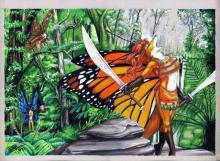 A Whisper of Wings
A Whisper of Wings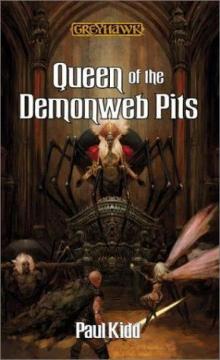 Queen of the Demonweb Pits (greyhawk)
Queen of the Demonweb Pits (greyhawk)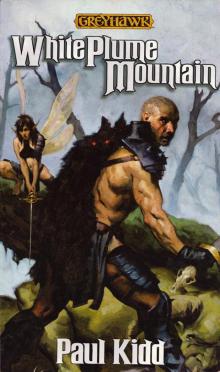 White Plume Mountain (greyhawk)
White Plume Mountain (greyhawk)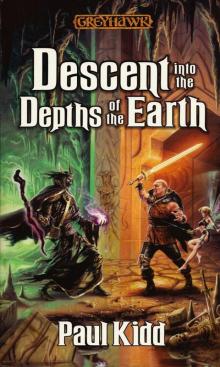 Descent into the Depths of the Earth (greyhawk)
Descent into the Depths of the Earth (greyhawk)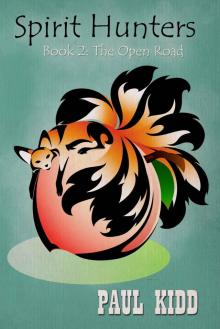 The Open Road
The Open Road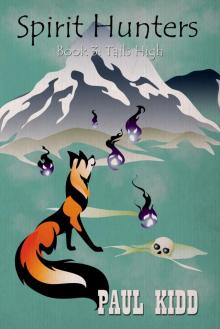 Tails High
Tails High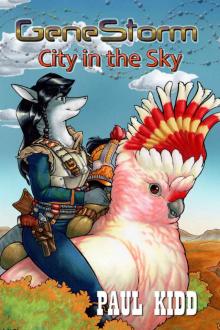 GeneStorm: City in the Sky
GeneStorm: City in the Sky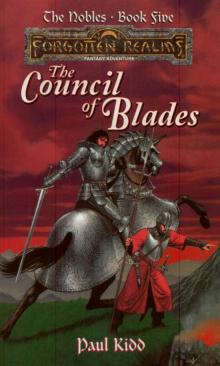 The Council of Blades n-5
The Council of Blades n-5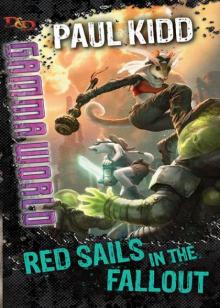 gamma world Red Sails in the Fallout
gamma world Red Sails in the Fallout